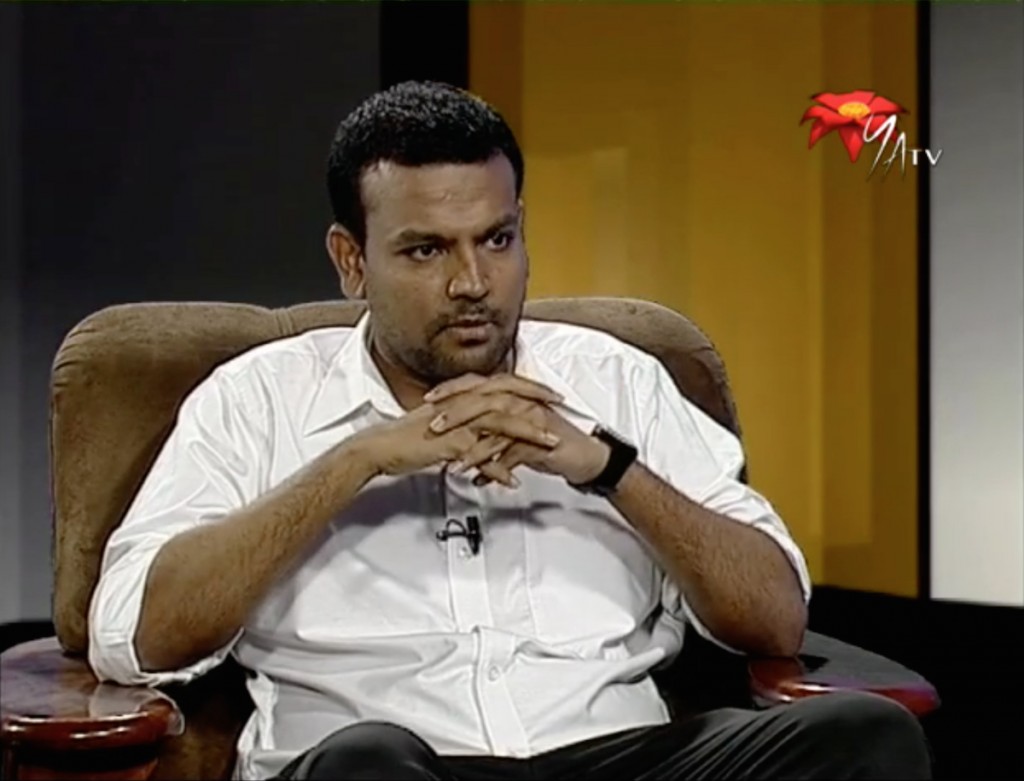Kalana Senaratne is a distinguished columnist and researcher. Readers of Groundviews would be most familiar with his writing on the rise of militant Buddhism in Sri Lanka, though he has written consistently of issues of governance, rights, politics and religiosity since 2009.
We caught up on TV recently to talk about at greater depth and length some issues he flags in his writing, and begin by exploring how and why he started to write in mainstream and web media, especially given the nature of the topics he addresses. Kalana notes how he moved from the erstwhile ‘Peace Secretariat‘ and then on to the Foreign Ministry. When asked whether he still harbours a desire to work with the Ministry, his answer is categorical, “once you go there, you don’t think of going back”, noting that the environment was not conducive to critical thinking.
Flagging his essay on the late Lakshman Kadirgamar, Kalana is asked whether, in light of his take on the Foreign Ministry and Sri Lanka’s foreign policy today, we can expect a similar individual to emerge. Kalana’s response is unequivocal – he posits that there is really no hope for the emergence of such an individual and moreover sees the present context as one where such an individual wouldn’t be able to work in, much less emerge from.
Given his own analysis of what is a systemic failure of governance with “no hope” of any course correction, Kalana is then pushed to answer why he writes on what he does, and in the manner he does.
We then talk about how nationalism is used in Sri Lanka’s political discourse, especially in the South, anchoring it to Kalana’s critique of Gomin Dayasiri’s submission around a ‘progressive’ Sinhala nationalism some years ago.
Kalana goes on to talk about the incredible rise of extremist Buddhist monks, focussing on his own writing in this regard that charts the progress of what was fringe lunacy becoming firmly entrenched in mainstream politics.
Reminded of a seminal essay he wrote two years ago around how these destructive militant Buddhist monks could be held in check,
At the end of the day, it needs to be reiterated – not once, twice but a hundred times if necessary – that it is the community of Buddhist monks which can most effectively and significantly end this madness that is being carried out by some in the name of Buddhism.
Kalana is asked why this hasn’t happened, and shows no signs of happening either. Kalana goes further and admitting his naivety when he wrote that essay two years ago, suggests that the destructive, violent project of the BBS and its ilk is in fact the project of the Sangha community writ large. When asked to respond to former Ambassador Dayan Jayatilleka’s submission that what we are seeing is a meteoric rise in theocratic fascism, Kalana clearly notes that it will lead to even more violence.
We then go on to look at Kalana’s submission, around the time of the last Presidential election, that continuity was better than change.
Much of this would not have been the case if the UNP had been able to find for itself a credible and popular leader apart from Ranil, who could promise the kind of change that is truly needed today. This has not happened. Until that happens, until there is greater vision and clarity as to what the Opposition wants to do with this nation and her people, continuity, I am sad to say, is a safer option than change.
Kalana is asked whether he still believes that continuing with the system we have today is better than change, especially since the Opposition in the form of the UNP is even more irrelevant today than it was in 2010.
We then go into the issue of defining and the need to define a Sri Lankan identity, and why most of the discourse around both glosses over the Tamil national question and the recognition of Tamils as an “equal people”. Speaking about two tsunamis – the Boxing Day tsunami of 2004 and the Northern Provincial Council election results in 2013, Kalana looks at how and why we’ve lost an opportunity to move forward, post-war, in addressing systemic challenges that resulted in violence.
